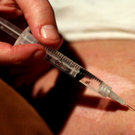Neupogen And Neulasta Show Comparable Activity In Multiple Myeloma Patients After Stem Cell Transplantation

Results of a recent Italian study show that Neupogen and Neulasta are comparable in efficacy and safety for the prevention and treatment of low white blood cell counts in multiple myeloma patients receiving outpatient stem cell transplants.
However, patients who were treated with Neulasta only received one injection after the transplant, which according to the study authors may be more convenient for the patients.
“In our experience, the possibility of a single [injection] is more comfortable for patients, mainly in an outpatient regimen,” said Dr. Felicetto Ferrara of the Cardarelli Hospital in Italy and lead author of the study.
Dr. Amrita Krishnan of City of Hope in Duarte, California, agreed that Neulasta may be more user-friendly for myeloma patients. However, she pointed out that that most patients who receive a transplant on an outpatient basis are seen daily.
Moreover, she added that additional data would be useful to confirm the results of this study.
“[We] would need a larger, multicenter study; other endpoints would also be useful, [such as] the incidence of infections. [We] should also look at the cost factors,” Dr. Krishnan told the Myeloma Beacon.
High-dose chemotherapy followed by autologous stem cell transplantation is the standard of care for multiple myeloma patients up to 65 years of age. Low white blood cell counts, or neutropenia, is a common side effect of stem cell transplantation and increases the risk of infection in the patients after transplantation.
Neupogen (filgrastim) is a granulocyte colony-stimulating factor which increases the production of white blood cells in myeloma patients in order to prevent infections and fevers associated with low white blood cell counts.
Neulasta (pegfilgrastim) is a derivative of Neupogen which stays in the body for a longer period of time. Therefore, Neulasta is given as a single injection after stem cell transplantation, whereas Neupogen is administered daily until patients achieve stable white blood cell counts.
In this retrospective study, researchers compared the efficacy and safety of Neulasta to Neupogen in myeloma patients following outpatient stem cell transplantation.
The study included 119 multiple myeloma patients who received a preparative regimen of melphalan (Alkeran) followed by stem cell transplantation.
Of the 119 patients included in the study, 32 percent received Neulasta and 68 percent received Neupogen after the transplant. The median age of patients who received Neulasta and Neupogen were 59 years and 57 years, respectively.
Neulasta was administered as a single 6 mg injection five days after the transplant. In contrast, Neupogen was administered daily starting on the second day after transplantation until the patients achieved stable white blood cell counts. They received a median of eight injections.
According to Dr. Ferrara, less than 10 percent of patients who received either Neulasta or Neupogen experienced low white blood cell counts with fever. Furthermore, the median number of days of fever did not differ between the two patient groups.
In addition, there were no differences between the patient groups with regard to white blood cell recovery and the amount of supportive therapy given.
The rate of inflammation in the digestive tract was also comparable between patients who received Neulasta (20 percent) and Neupogen (18 percent).
While the rate of hospital readmission was lower for patients who received Neulasta (12 percent) than those who received Neupogen (26 percent), this difference was not considered statistically significant.
The most common reasons for readmission for both groups were oral inflammation, fever of unknown origin, and severe diarrhea.
The study authors speculated that the reason for the lower rate of hospital readmission for patients who received Neulasta was that they participated in more recent and more developed outpatient transplant procedures.
“In [recent] years, we have acquired more experience in the procedure and [fewer] patients have been hospitalized,” Dr. Ferrara told the Myeloma Beacon.
“Accordingly, [the rate of hospital readmission] does not depend on the drug, but rather on our skill,” he added.
Among all the patients in the study, only one died from severe infection, and that patient had been treated with Neupogen.
For more information, please see the study in the journal Hematological Oncology (abstract).
Related Articles:
- None Found

Hello Myeloma Beacon,
I was given a dose of Neulasta due to some mix up with my insurance, we could not get Neupogen at the time. After a day or two I had severe reactions to Neulasta. I ached to badly I thought I was dying. Luckily my daughter was visiting and forced me out of bed to the ER. I couldn't get dressed. I was admitted and ended up in the hospital for 10 days. Some random infection. I would have just stayed in bed I hurt so bad.
I have to be very careful to not let myself get to that point. First its dehydration, then extreme fatigue, then not eating a drop, no meds, then pretty much the 24 hour sleeping. Sleeping so hard I don't hear the phone ring. Then I am sick. I have since promised everyone and the moon to drink my water and to call before all of this happens.
Hi Tricia!
It’s great to hear from you. Thanks for stopping by and sharing the experience you had when you were being treated with Neulasta.
Did you ever hear from anyone at the hospital whether the infection you got was tied in anyway to the Neulasta you were getting?
From the first part of what you wrote — where you say “severe reactions to Neulasta” — it sounds like the Neulasta played a big part in what happened.
But later you say it was “some random infection”, which makes me wonder if the Neulasta really had anything to do with it.
In any case, we’re glad you got over it, and that you’re doing well now.
Take care,
The Beacon Team
Get new Myeloma Beacon articles by email.